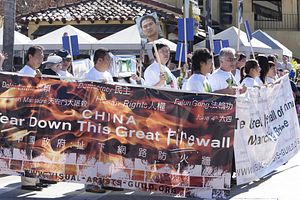The Chinese linguist Liu Bannong was a man of singular intellect. After receiving his Ph.D. at the University of Paris in 1925, he went on to co-author a book that would guide the standardization of simplified Chinese. Liu was also an influential contributor to the magazine La Jeunesse (also known as New Youth), a renowned photographer, possibly the inventor of the pronoun ta or “she,” and one of the New Culture poets.
As their name suggests, the New Culture poets were a progressive group, drawing inspiration from the works of their Western confrères just as their Anglophone contemporaries, the Imagists, drew from the works of classical Chinese poets. In a poem about the Great Wall, a popular metaphor then for tyrannical rule, Liu recalls the legend of Lady Meng Jiang, whose husband was forced to help build the Wall. When Lady Meng journeyed to see her love, only to discover he was already dead, her tears were so abundant that they brought down a part of the wall. Liu wrote:
To this day people are still talking of Meng Jiang Nü
Yet no more is said of the First Emperor of Qin or the Martial Emperor of Han
Throughout the ages nothing is sadder than an ordinary tragedy
In her tears Meng Jiang Nü lives through all eternities.
This comes to mind whenever I think of Liu Xia, the wife of Nobel Peace Prize laureate Liu Xiaobo, whose husband sits in prison, a casualty of the Great Firewall. I think of her not because her tears have any hope of bringing down a section of the wall, but because hers is “an ordinary tragedy.” Like the Great Wall of 1920s poetry, the Great Firewall might serve as a convenient symbol for tyranny.
But to most Chinese, it doesn’t feel that way. Their lack of access to Facebook or Google is as normal to them as their lack of access to the coral gardens of the Bahamas — a consequence of geography. Westerners who consider the Internet an instrument of social change in China forget that not too long ago, the same was said of capitalism.
Let’s not forget the role of Western powers, either. For example, the American multinational Cisco Systems helped China establish its Internet — and its censorship program. Google and Microsoft currently legitimize the suppression of information by self-censoring. The head of Internet policy in China, Lu Wei, was warmly welcomed by Amazon, Apple, and Facebook executives when he visited California last December. And Yahoo! went so far as to help authorities capture the poet Shi Tao in 2005. Shi was subsequently incarcerated for emailing information about censorship.
Another mistake is to assume that the purpose of censorship in China is to silence political dissent. But a 2013 Harvard study found that, “contrary to previous understandings, posts with negative, even vitriolic, criticism of the state, its leaders, and its policies are not more likely to be censored.” Rather, the purpose of censorship in China appears to be “curtailing collective action” by preventing “social mobilization, regardless of content.”
Yet it’s the normalization of censorship that worries me; the way that so many shrug when the matter comes up. If we do not value information, and access to it, then we devalue truth. As Alfred Griswold once said, “the only sure weapon against bad ideas is better ideas.”
For now though, the Chinese marketplace of thought is a monopoly run by anti-intellectuals. To give you some idea what the result of this is, last week I was having a drink with a friend when a Chinese couple joined our table. The young woman immediately helped herself to a glass of our wine, then introduced herself as a poet writing for “the best poetry journal in China,” Xiangpi.
She had my attention, and despite the liberty she’d taken with our wine, I smiled and introduced myself, asking what kind of poetry she wrote. Glowing with pride, she said she wrote about “drinking, playing with her friends, and going to nightclubs.”
Well, I thought, that’s the kind of grass you get when you shut off the water supply. Why do I feel Liu Bannong would be turning in his grave?

































